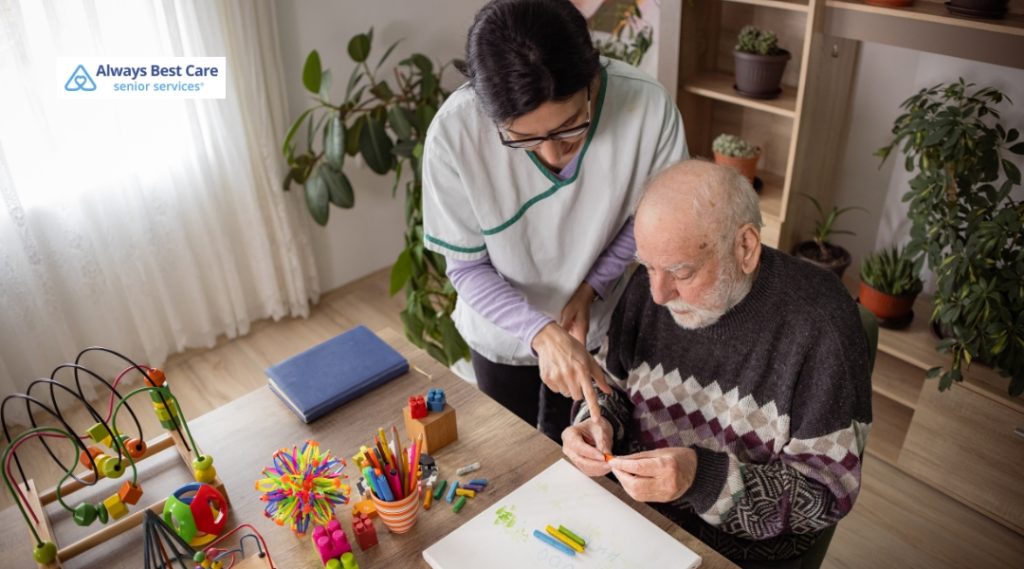Early Signs of Dementia You Shouldn’t Ignore in West Monroe, LA

As our loved ones age, it’s common to notice a few slips in memory or behavior. But how do you know when these changes are more than just a part of growing older?
Early signs of dementia can be subtle, but recognizing them is crucial for getting the right help and maintaining quality of life.
In this article, we’ll look at the key differences between normal aging and early dementia signs, and explore how support can make a real difference.
What you will learn:
- The difference between normal aging and early dementia, and how to spot warning signs.
- Seven key symptoms of dementia that should not be overlooked.
- The importance of early detection for diagnosis, management, and planning.
- How in-home care from Always Best Care of West Monroe supports seniors with dementia and their families.
Table of Contents
Normal Aging vs. Early Dementia
Normal aging often involves some forgetfulness, like struggling to recall a word or forgetting why you walked into a room. However, the information usually comes back, and daily life isn’t significantly disrupted. Seniors can still manage their tasks, keep appointments, and make sound decisions.
On the other hand, dementia is a progressive condition that affects memory, communication, reasoning, and judgment, eventually requiring full-time care.

7 Key Dementia Signs You Shouldn’t Ignore
Here are some early signs of dementia that shouldn’t be brushed off:
- Frequent Memory Loss That Disrupts Daily Life: Forgetting recently learned information or relying heavily on others for tasks they used to handle alone can be a red flag.
- Difficulty Completing Familiar Tasks: Struggling with recipes, balancing a checkbook, or using appliances they’ve used for years may indicate problems with concentration or problem-solving.
- Trouble Finding Words or Following Conversations: Early dementia can make it hard to express thoughts or understand others. This might show up as frequent pauses, repetition, or difficulty naming everyday objects.
- Poor Judgment or Decision-Making: This could include giving away large sums of money, neglecting hygiene, or dressing inappropriately for the weather.
- Confusion About Time or Place: Getting lost in familiar places, forgetting how they got somewhere, or being confused about the date or season are all signs to watch for.
- Changes in Mood or Personality: Unusual irritability, depression, anxiety, or withdrawal from social activities can be significant changes.
- Misplacing Items and Losing the Ability to Retrace Steps: Putting items in unusual places and being unable to find them again without help is a common symptom.
How Early Detection Can Help
Early detection of dementia allows for a more accurate diagnosis and better management. It also provides time for planning, accessing resources, and involving the family.
If you’ve noticed any of these signs in a loved one, it’s essential to speak with a healthcare provider.

How In-Home Care Can Support Your Loved One
Caring for someone with dementia can be emotionally and physically challenging. In-home care from Always Best Care of your city can make a real difference. Our caregivers are trained to recognize early symptoms of cognitive decline and keep families informed. They can assist with daily tasks, encourage mental stimulation, and provide companionship.
Having a compassionate caregiver at home gives families peace of mind, ensuring that their loved one is safe, supported, and able to maintain as much independence as possible.
FAQ
Q: What is the difference between normal aging and early dementia?
A: Normal aging involves forgetfulness that doesn’t disrupt daily life, while early dementia affects memory, communication, and judgment, impacting daily functioning.
Q: How can I support a loved one showing signs of dementia?
A: Early detection is key. Seek professional evaluation, and consider in-home care for support with daily tasks and companionship.
Q: Can dementia be treated or managed?
A: While there’s no cure, early detection and management can improve quality of life. Medications and lifestyle changes can help manage symptoms.

Schedule Your Complimentary Consultation at Always Best Care of West Monroe!
If you’re concerned about memory changes in someone you care about, don’t wait to take action. Contact Always Best Care of West Monroe at (318) 322-2223 for a care consultation. Our experienced team can help you understand your options and create a care plan tailored to your loved one’s unique needs. Early support matters—and you don’t have to navigate it alone.





